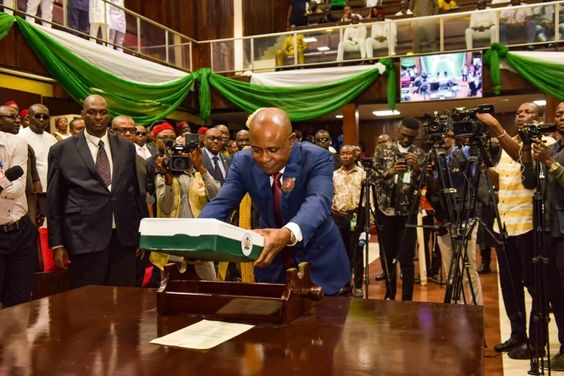Nigeria
Enugu: Teachers and economists commend Gov Mbah for his 2024 budget

The Labour Party, civil society organisations, and economists are giving the Enugu State Government’s 2024 budget proposal positive evaluations, hailing it as pro-masses and capable of reversing the state’s declining fortunes.
Remember that the N521.5 billion 2024 Appropriations Bill was presented to the Enugu State House of Assembly on Tuesday by Governor Dr. Peter Mbah. The budget, dubbed the “Budget of Disruptive Economic Growth,” is made up of N107.2 billion in recurring expenses and N414.3 billion in capital expenditures, or around 79 percent of the total.
Read Also: Appeal Court rules in favor of Enugu lawmaker’s reinstatement
Education received 73.6% of the social sector allocation and 33% of the total budget, while the economic sector and infrastructure ranked highest on a sectoral allocation basis with N207.8 billion and N182.9 billion in capital expenditure distribution, respectively.
Comrade Theophilus Odo, the chairman of the NUT’s Enugu State wing, responded to the budget projections by saying, “The governor has demonstrated in every way that he has great interest in education.” To be honest, we didn’t really believe him when he declared at the most recent ESUT convocation that education will receive more than thirty percent of the budget because it had never happened before in Nigeria, not even at the federal level. However, we are pleased and delighted that a leader is now devoting the necessary attention to this crucial industry.
“One of the most reliable methods to guarantee the long-term eradication of poverty is via education, as the governor correctly noted in his budget speech. This budget is impliedly for the good of our kids, the educators, and society as large.
Therefore, I would want to express my sincere gratitude to the governor for his wonderful vision for education in the state on behalf of all of the teachers in Enugu State.
Development economist Chibuzo Aniekwe, on the other hand, claims that the budget bears witness to the administration of Mbah’s overarching goal.
“The budget forecasts for the fiscal year 2024 are significantly weighted towards inclusive growth, with 78–79% of total expenditures allocated to capital and 21% to recurring expenditures.
The capital expenditure reveals a sharp increase in infrastructure in areas such as functional Tier One Health Services and Smart Early Education.
The far left reduction in recurring costs that underpins disruptive innovation is useful to note, as the majority of government transactions will shift from labor-intensive to technology-intensive delivery methods.
The massive infrastructure will highlight the transfer of income and currency in a cyclical fashion, returning the government to its core responsibility as an instrument of economic distributive justice.
“This budget will lower inflation because it will lead to resource optimisation and efficiency,” Aniekwe said.
Furthermore, the substantial allocations to the economy and social sector “showed a good intention to lift the people out of poverty and avail them of quality social services,” according to Peter Ugwu, Director of Communications and Public Enlightenment at the Centre for Humanity.
The proposed large-scale investments in water, health, infrastructure, education, and other areas are indicators of a people-focused government. When it is eventually passed and signed into law, we will independently oversee its implementation and hold the government responsible,” the Centre declared.
